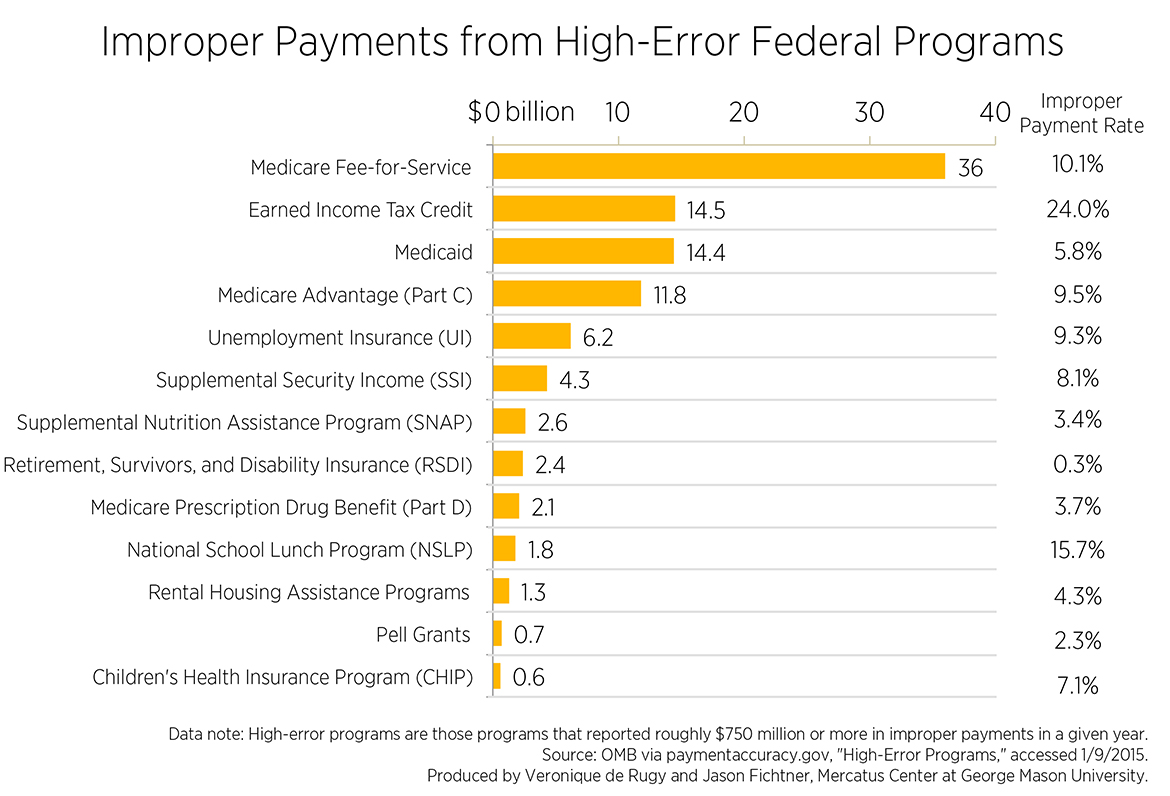- | Government Spending Government Spending
- | Data Visualizations Data Visualizations
- |
Is Federal Spending Too Big to Be Overseen?
This week’s chart presents improper payments made by the thirteen programs that the Office of Management and Budget has labeled “high-error.” The chart ranks transfer programs that allocate at least $750 million in payments from those with the lowest improper payments to those with the highest. The chart also displays the total improper-payment rates as a percentage of total program outlays for each program.
According to the federal government’s latest estimates, government programs for fiscal year 2013 paid out $106 billion “improperly,” payments, that is, that violated guidelines or rules in some way. Fraud is not the only reason, as the government reports. They can also result from simple clerical errors or a failure to confirm that a recipient was eligible to receive the amount of money that was disbursed. Whether owing to fraud, bureaucracy, or the complexity of program rules, $106 billion is a significant amount of taxpayer funds. Federal spending has grown too massive to be adequately overseen.
This week’s chart presents improper payments made by the thirteen programs that the Office of Management and Budget has labeled “high-error.” The chart ranks transfer programs that allocate at least $750 million in payments from those with the lowest improper payments to those with the highest. The chart also displays the total improper-payment rates as a percentage of total program outlays for each program.
Some programs, like the Earned Income Tax Credit (EITC), not only have a high improper-payment amount but also a relatively high improper-payment rate. The $14.5 billion in improper EITC payments represents a substantial portion, 24 percent, of total EITC spending, suggesting that the EITC is particularly prone to fraud, waste, and abuse. As the chart shows, the National School Lunch Program, Medicare Fee for Service, Medicare Advantage (Part C), and Unemployment Insurance (UI) face problems similar to the EITC.
Other programs, such as the Social Security Retirement, Survivors, and Disability Insurance (RSDI) programs, have improper-payment amounts that are relatively high when compared to their improper-payment rate. While $2.4 billion was improperly spent on Social Security benefit payments in 2013, the large overall amount of benefit payments made by the agency ($770.3 billion in 2013) means that the improper-payment rate is only 0.3 percent. However, just because a program has a low reported rate doesn’t mean that taxpayers should be pleased. Programs that have seen expanded eligibility over the years (e.g., Social Security disability and food stamps) might have relatively low improper-payment rates, but they’re also distributing money to people under questionable—and, in some cases, objectionable—circumstances.
It is worth noting that the government’s figures are only estimates, and there is reason to believe they low-ball the amount of taxpayer dollars lost to fraud and bureaucratic ineffectiveness. For example, three of the largest programs in terms of improper-spending amounts are all health care related. Medicare Fee-for-Service, Medicare Advantage (Part C), and Medicaid combined amounted to $62.2 billion in improper payments in fiscal 2013. Further, Malcolm Sparrow of Harvard University, a recognized expert in health care fraud, argues that federal auditors underestimate the volume of improper payments resulting from fraud. He believes fraud could account for as much as 20 percent of federal health spending, which would considerably increase the improper-payment figure reported by the government.
Waste, fraud, and abuse squander public resources. Policymakers on both sides of the aisle also recognize that the American people have little tolerance for waste, fraud, and abuse. In fact, it is difficult, if not impossible, to find policymakers who don’t tell their constituents that they’ll work to eliminate government waste. While people on both sides of the political aisle can debate the merits of whether or not government should be involved in certain activities, no one in good conscience should tolerate the high levels of improper payments currently associated with government spending on social welfare programs.


